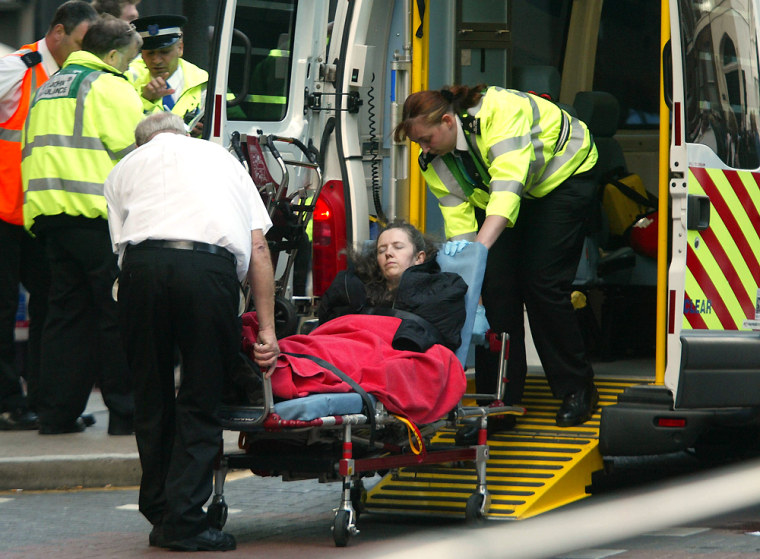British officials reported all types of injuries from the series of blasts in London on Thursday, including burns, amputations, fractured bones, smoke inhalation, shock and minor injuries such as superficial cuts. Some people were trapped underground for hours.
"There’s a lot of force released when a bomb goes off; people are thrown around causing major fractures," said Dr. Joseph Braverman, chief of emergency services at the Weiler Division of the Albert Einstein College of Medicine at Montefiore Medical Center, Bronx, N.Y. "The degree to which people are going to be injured is a function of how close they are to the blast site. The closer, the more life-threatening the injuries."
Scores were killed in the four explosions that rocked the London subway system and a bus. Those with critical injuries were treated at the scene while others were taken to five London hospitals, British officials said in a news conference.
Damage from smoke inhalation
There were numerous reports of smoke pouring through the subway tunnels and carriages. Damage from smoke inhalation can be a serious side effect from bomb blasts, causing blockage of the airways, damage from poisonous gases and injury to the lungs, medical experts say. Symptoms of severe smoke inhalation include coughing, vomiting, breathing difficulties and sleepiness or confusion. Victims are treated with oxygen and doctors often put a tube down the patient's throat to prevent airways from closing.
Over 100 ambulance vehicles and 250 ambulance staff attended the explosion scenes following the attacks. Some of the injured were reportedly transported to hospitals in double-decker buses. Hotels took in some of the wounded, according to NBC reports.
Those not seriously injured by the explosions still ran the risk of developing shock, which occurs when the heart fails to deliver oxygen to the body in the wake of a traumatic event.
People with non-urgent complaints were urged to stay away from hospitals.
Even though London's emergency services were pushed to the limit, with medics treating the wounded on train platforms and in a makeshift field hospital set up in a retail store, emergency medical care in countries like Great Britain and the United States is "very sophisticated," notes Braverman.
"The algorithms of what to do and how to take care of these people are pretty well laid-out and practiced in drills," he said.
Psychological aftermath
Beyond the immediate physical injuries, the victims of the bomb blasts, as well as average citizens of London, can expect to feel the psychological effects for some time, said Dr. Daniel Nelson, psychiatrist at Cincinnati Children's Hospital.
At high risk for emotional problems are those who have experienced previous trauma, such as fire, flood or abuse.
"Like in New York [after September 11], the entire city is suddenly functioning on an entirely different level," says Nelson. "For those hurt or killed and their families, the impact is profound."
Symptoms of emotional distress tend to come fairly quickly after a traumatic event, he said. People can relive the event in dreams, have difficulty concentrating or trouble getting work done. They can develop insomnia, experience preoccupation with mortality or worries about being separated from their children.
"That’s fairly healthy; it’s better not to ignore it," said Nelson, who was involved in counseling during the Oklahoma City bombing and the Sept. 11 attacks.
The best ways to cope with the psychological effects are to try to get back into the same routine and limit intake of alcohol or caffeine, Nelson added.
"Sharing your story with someone you know and trust can be helpful," he said.
